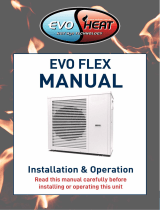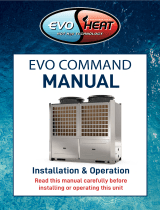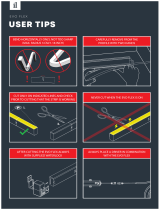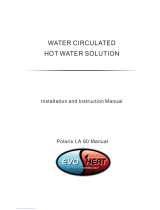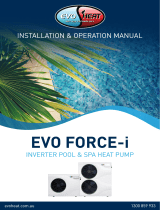Page is loading ...


1
Evo Flex Manual
Contents
1. Introduction _____________________________________________________________________________________ 2
2. Unit Specifications ________________________________________________________________________________ 3
2.1 Unit Structure ________________________________________________________________________________ 3
2.2 Technical Data ________________________________________________________________________________ 4
2.3 Dimensions __________________________________________________________________________________ 5
3. Safety Instructions ________________________________________________________________________________ 6
4. Installation ______________________________________________________________________________________ 6
4.1 Transit ______________________________________________________________________________________ 6
4.2 Application of Heat Pump for Cooling ______________________________________________________________ 7
4.3 Location of Install & Minimum Clearances __________________________________________________________ 7
4.4 Water Loop Connection ________________________________________________________________________ 8
4.5 Electrical Connection ___________________________________________________________________________ 8
4.6 Initial Start-up of the Unit _______________________________________________________________________ 8
5. Operation_______________________________________________________________________________________ 9
5.1 Main Interface Display and Function_______________________________________________________________ 9
5.2 Functions of the Controller ______________________________________________________________________ 9
5.2.1 Turning On & Off __________________________________________________________________________ 9
5.2.2 Mode Switch ____________________________________________________________________________ 10
5.2.3 Setting Target Temperature _________________________________________________________________ 10
5.2.4 Fast Heating _____________________________________________________________________________ 10
5.2.5 Timer Setting ____________________________________________________________________________ 11
5.2.6 Setup Interface ___________________________________________________________________________ 11
5.2.7 Setting the Date & Time ____________________________________________________________________ 11
5.2.8 Fault Interface ___________________________________________________________________________ 12
5.2.9 Colour Display Calibration __________________________________________________________________ 12
6. Troubleshooting ________________________________________________________________________________ 13
6.1 Electronic Control Fault Table ___________________________________________________________________ 13
6.2 Frequency Conversion Board Fault Table __________________________________________________________ 14
6.
3 Troubleshooting Table_________________________________________________________________________ 15
7. Appendix ______________________________________________________________________________________ 16
7.1 Parameter List _______________________________________________________________________________ 16
7.2 Install Sketch Map ____________________________________________________________________________ 16
7.3 Automatic Filled-Water ________________________________________________________________________ 17
7.4 Leakage Pressure Valve ________________________________________________________________________ 17
7.5 Assistant Heat Source Connection _______________________________________________________________ 18
7.6 Cable Specifications ___________________________________________________________________________ 18
7.3 Controller Interface Drawing ____________________________________________________________________ 19
8. Maintenance ___________________________________________________________________________________ 21
9. Warranty ______________________________________________________________________________________ 22

2
Evo Flex Manual
1. Introduction
This manual contains all the necessary information in regard to the installation, troubleshooting, operation and
maintenance of this unit. Ensure instructions in this manual are adhered to at all times. Failing to comply with these
recommendations will invalidate the warranty. This manual and all others are available for download on our website.
With the application of DC inverter technology, the Evo Flex Series can adjust the output capacity automatically and
control the room temperature accurately. The Evo Flex Series is ideal for domestic hot water and space heating and
cooling.
• Latest DC invert heat pump technology
• One heat pump for hot water and space heating and cooling
• Energy savings, 30% less energy consumption compared to a fixed speed heat pump
• Reduces energy use and green house gases
• Precise temperature control
• Speed up heating/cooling time
• Wired controller, easy to operate, intelligent colour touch screen controller
• Intelligent defrosting
• Monobloc design
• Works efficiently with floor heating, water fan coils or radiators

3
Evo Flex Manual
2. Unit Specifications
2.1 Unit Structure
Evo Flex 10
Evo Flex 17 & 25

4
Evo Flex Manual
2.2 Technical Data
Evo Flex
10
17
25
Cooling Capacity
kW
10
14.5
20
BTU/h
34121
49489
68260
Heating Capacity
kW
11.5
16.5
25
BTU/h
39240
56315
85325
Hot Water Capacity
kW
13.2
21.6
30
BTU/h
45040
73702
102364
Cooling Power Input
BTU/h
3.4
5.6
9.0
Heating Power Input
kW
3.4
5.1
9.0
Hot Water Power Input
BTU/h
3.6
6.2
8.2
Operation Electric Current (max)
kW
15.7
27
14.0
Cooling Capacity Range
kW
2.0 ~ 10
5.0 ~ 14.5
7.0 ~ 20.0
Heating Capacity Range
kW
2.5 ~ 11.5
5.0 ~ 16.5
8.0 ~ 25.0
Hot Water Capacity Range
A
4.2 ~ 13.2
7.4 ~ 21.6
11.0 ~ 30.0
Cooling Power Input Range
kW
1.0 ~ 3.4
1.6 ~ 5.6
2.5 ~ 9.0
Heating Power Input Range
kW
0.8 ~ 3.4
1.2 ~ 5.1
2.5 ~ 9.0
Hot Water Power Input Range
kW
1.0 ~ 3.6
1.5 ~ 6.2
2.1 ~ 8.2
Power Supply
230V~/50Hz
230V~/50Hz
380V/3N~/50Hz
Compressor Quantity
1
1
1
Compressor Model
Rotary
Rotary
Rotary
Fan Quantity
1
2
2
Fan Power Input
W
75
75 X 2
150 X 2
Fan Rotate Speed
RPM
850
850
900
Noise
dB(A)
54
58
62
Water Pump Input
kW
0.18
0.5
0.65
Water Head
m
12.5
21
22.5
Water Connection
inch
1
1 1/4
1 1/4
Water Flow Volume
m
3
/h
1.6
2.8
4.2
Water Pressure Drop (max)
kpa
24
105
71
Unit Net Dimensions (L/W/H)
mm
953*445*910
996*395*1320
1175*400*1592
Unit Shipping Dimensions (L/W/H)
mm
1040*490*920
1070*435*1340
1225*430*1600
Net Weight
kg
See Nameplate
See Nameplate
See Nameplate
Shipping Weight
kg
See Package Label
See Package Label
See Package Label
Cooling Working Condition: (DB/WB)35°C/24°C, (outlet/inlet) 7°C/12°C
Heating Working Condition: (DB/WB) 7°C/6°C, (outlet/inlet) 35°C/30°C
Hot Water Working Condition: (DB/WB) 20°C/15°C, (outlet/inlet) 40°C/45°C
BS EN 14511-1-2013 Air Conditioner, whole liquid cooling machine, electric compressor.
Part 2: Test condition Part 3: Test Method Part 4: Related requirements.

5
Evo Flex Manual
2.3 Dimensions
Evo Flex 10
Evo Flex 17
Evo Flex 25

6
Evo Flex Manual
3. Safety Instructions
• Installation, repair or relocations must be done by a fully qualified person and not by the customer. If done
incorrectly it may cause fire, electric shock, water leakage and other hazards.
• Maintenance and operation must be carried out according to the recommended time and frequencies, as
stated in this manual.
• To avoid risk of electrical shock, the unit must have a good power connection and earthing.
• If the supply cord is damaged, it must be replaced.
• Use genuine standard spare parts only.
• When an abnormality (smell of burning, etc.) occurs, stop the unit and disconnect the power or turn off the
breaker. If the unit continues to be operated in an abnormal condition, it may cause a fire or hazards.
• Do not insert fingers or objects into the fans or evaporator of the unit.
• The unit is equipped with an over-load protection system. After a previous stoppage, the unit will not start
for at least 3 minutes.
• For unit cleaning or maintenance, switch off and disconnect the power of the unit.
• Do not install the unit near flammable gas or spray flammable substances near it.
• Ensure the heat pump is installed on a strong and stable platform.
• A circuit breaker must be installed for the unit.
• Use supply wires suitable for 75°C
* Caution: Single wall heat exchanger, not suitable for potable water connection.
4. Installation
Based on the local climate conditions, construction features and insulation level, calculate the required cooling
(heating) capacity per square meter.
Conclude the total capacity which will be needed by the construction.
According to the total capacity needed, choose the right model by consulting the heat pump features as below:
Heat Pump Features
Cooling Only Unit: chilled water outlet temp. at 5-15°C, maximum ambient temp. at 43°C
Heating and Cooling Unit: for cooling chilled water outlet temp. at 5-15°C, maximum ambient temp. at 43°C.
For heating warm water inlet temp. at 40-50°C, minimum ambient temp. at -10°C.
Unit Application
The Evo Flex can be installed in houses, offices, hotels and many more locations which require heating and cooling
separating, with each area needing to be controlled independently.
4.1 Transit
If the unit needs to be hung up during installation, an 8-metre cable is required. There
must be a soft material between the cable and the unit to prevent damage to the heat
pump cabinet.
WARNING
DO NOT touch the heat exchanger of the heat pump with fingers or other objects!

7
Evo Flex Manual
4.2 Application of Heat Pump for Cooling
4.3 Location of Install & Minimum Clearances
The heat pump can be installed onto the concrete basement by using expansion screws, or onto a steel frame with
rubber feet which can be placed on the ground or the roof. Ensure that the unit is placed horizontally.
• The unit can be installed in any place outdoors which will be able to support the weight of a heavy unit such
as a terrace, roof, the ground and any other places deemed suitable.
• The location must have good ventilation.
• The location must be free from heat radiation and other fire hazards.
• A pall is needed in winter to protect the unit from snow.
• There must be no obstacles near the inlet and outlet of the unit.
• The installation location must be protected from strong winds or air.
• There must be a water channel around the heat pump to drain condensing water.
• Leave enough space around the unit for maintenance.
A > 500mm
B > 1500mm
C > 1000mm
D > 500mm

8
Evo Flex Manual
4.4 Water Loop Connection
Pay attention to the below matters when the water pipe is connected.
• Try to reduce the resistance to the water from the piping.
• The piping must be clear and free from dirt and blockage. A water leakage test must be carried out to ensure
that there is no water leaking before the installation can be made.
• The pipe must be tested by pressure separately. DO NOT test it together with the unit.
• There must be an expansion tank on the top point of the water loop, and the water level inside the tank
must be at least 0.5meters higher than the top point of the water loop.
• The flow switch is installed inside of the heat pump, check to ensure that the wiring and action of the switch
is normal and controlled by the controller.
• Try to avoid any air from being trapped inside the water pipe, there must be an air vent on the top point of
the water loop.
• There must be a thermometer and pressure meter at the water inlet and outlet for easy inspection during
running.
4.5 Electrical Connection
• Open the front panel and open the power supply access.
• The power supply must go through the wire access and be connected to the power supply terminals in the
controlling box. Then connect the 3-signal wire plugs of the wire controller and main controller.
• If an external water pump is required, please insert the power supply wire into the wire access and connect
it to the water pump terminals.
• If an additional auxiliary heater is needed to be controlled by the heat pump controller, the relay (or power)
of the aux-heater must be connected to the relevant output of the controller.
4.6 Initial Start-up of the Unit
INSPECTION BEFORE TRIAL RUNNING
• Check the indoor unit, make sure that the pipe connection is done correctly, and the relevant valves are open.
• Check the water loop to ensure that the water inside of the expansion tank is filled to an appropriate level, and
the water supply is working, and the water loop is full of water and free of trapped air. Make sure there is good
insulation for the water pipe.
• Check the electrical wiring. Make sure that the power voltage is normal, the screws are fastened, the wiring is
made in line with the diagram and that the earthing is connected.
• Check that the heat pump includes all the screws and components, and that they are in good order. When
powering the unit on, review the indicator on the controller to see if there is any indication of failure. The gas
gauge can be connected to the check valve to see the high pressure (or low pressure) of the system during trial
running.
TRIAL RUNNING
• Start the heat pump by pressing the ‘POWER’ button key on the controller. Check whether the water pump is
running, if it runs normally there will be 0.2MPa on the water pressure meter.
• When the water pump has ran for a minute, the compressor will start. Listen for any strange sounds from the
compressor, if an abnormal sound occurs please stop the unit and check the compressor. If the compressor runs
well please look for the pressure meter of the refrigerant.
• Check whether the power input and running current is in line with the manual. If not please stop and check.
• Adjust the valved on the water loop to make sure that the hot (cool) water supply to each door is good and
meets the requirements of heating (or cooling).
• Review whether the outlet water temperature is stable.
• The parameters of the controller are set by the factory, the user cannot change these themselves.

9
Evo Flex Manual
5. Operation
5.1 Main Interface Display and Function
Key No.
Key Name
Key Function
1
On and off
Click this key to switch ON or OFF
Red represents ON, while grey represents OFF
2
Mode key
Hot water mode, heating mode, cooling mode, hot water + heating
mode or hot water + cooling mode can be selected by pressing this key
3
Temperature setting
Click this to set the target temperature
4
Fast heating
Click this key to start rapid heating
This key will be displayed during heating
5
Timer setting
Click this key to set the timer. White represents not enabled, while
green represents enabled
6
Setup key
Click this key to check the unit status, time, factory parameters,
temperature curve, timer setting and mute setting
7
Fault icon
This icon will flash when there is an error occurring, then the display
will enter the failure record interface after tapping this icon
Icon No.
Icon Name
Meaning
8
Defrosting
The machine is in defrosting mode when this icon is shown
9
Hot Water Mode
This machine is in hot water mode then this icon is shown
10
Heating Mode
This machine is in heating mode when this icon is displayed
5.2 Functions of the Controller
5.2.1 Turning On & Off
1. In the shut-down interface (on/off key will be in grey), press the on/off key to start the unit
2. In the starting-up interface (on/off key will be red), pressing on/off will turn the unit off

10
Evo Flex Manual
5.2.2 Mode Switch
In the main interface, there are five modes that can be selected after tapping the mode key:
Note: If you have purchased a heating-only model (with no cooling functions), “cooling” mode will not appear
5.2.3 Setting Target Temperature
1. Pressing (1) will bring the controller back to the main
interface
2. Pressing (2) will allow the target temperature to be
set, a pop-up keyboard will appear
3. Pressing (3) will allow the target temperature of
cooling mode to be set through the keyboard
When the target temperature is being set, the following keyboard will appear
1. New target temperature under current settings
2. Return Key: returns you to the main interface
3. Delete Key: will undo your last action
4. Enter Key: Saves changes and return to menu
5.2.4 Fast Heating
Under heating mode, click the fast heating key (1) and the
following interface will appear. Click (2) to start fast-heating
mode and (3) to close it.

11
Evo Flex Manual
5.2.5 Timer Setting
Click the timer setting key to enter the timer settings and the following interface will appear
EXAMPLE: The unit will start-up at 17:10 and shut-down at 20:10.
KEY NAME
KEY COLOUR
KEY FUNCTION
1
Return
Key
Click this key to return to
the main interface
2
Enable
Timer
ON
Enable: Green ON
Disable: Grey OFF
Click this key to start or turn
off the timed start up
function
3
Enable
Timer
OFF
Enable: Green ON
Disable: Grey OFF
Click this key to start or turn
off the timed start up
function
5.2.6 Setup Interface
Key Name
Key Function
1 Status Key Click this key to get into the status interface
2 Clock Key
Click this key to set the operational time
function
3 Mute Key
Click to turn on/off silent function and to
set the timing interval function
4 Factory Key
Click this key to get into the factory
interface
5 Curve Key
Click this key to look up the temperature
curve
5.2.7 Setting the Date & Time
From the setup interface, press Clock to enter into the date & time setting interface. Use the arrows to adjust the
date and time as required, then press the Enter button to save changes. Press the return key to return to the
previous interface or press cancel to exit current settings.
Note: in Fahrenheit mode the system date format is: dd/mm/yy

12
Evo Flex Manual
5.2.8 Fault Interface
Click the fault icon on the main interface and it will display as follows:
1 Fault code
2 Fault Name
3 Date of fault occurrence (dd/mm/yy)
4 Click to clear all fault records
5.2.9 Colour Display Calibration
Keep clicking quickly at the blank area on any interface till you hear a long beep. Then you will enter the calibration
interface. Click "+" to start calibration. When you hear the beep again, you will have finished calibration and can exit.

13
Evo Flex Manual
6. Troubleshooting
6.1 Electronic Control Fault Table
Protect/Fault
Fault
Display
Reason
Elimination Methods
Inlet Temp. Sensor Fault
P01
The temp. sensor is broken or
short circuited
Check or change the temp. sensor
Outlet Temp. Sensor Fault
P02
The temp. sensor is broken or
short circuited
Check or change the temp. sensor
Water Tank Temp Sensor
P03
The temp. sensor is broken or
short circuited
Check or change the temp. sensor
At Sensor Fault
P04
The temp. sensor is broken or
short circuited
Check or change the temp. sensor
Suction Temp. Sensor Fault
P17
The temp. sensor is broken or
short circuited
Check or change the temp. sensor
Coil Temp Sensor
P153
The temp. sensor is broken or
short circuited
Check or change the temp. sensor
Exhaust Temp Sensor
P181
The temp. sensor is broken or
short circuited
Check or change the temp. sensor
Exhaust Overtemp
P182
The temp. sensor is broken or
short circuited
Check or change the temp. sensor
Suction Pressure Sensor Fault
PP2
The pressure sensor is broken
Check or change the pressure sensor or
pressure
Exhaust Pressure Sensor Fault
PP1
The pressure sensor is broken
Check or change the pressure sensor or
pressure
Low AT Protection
TP
The environment temp. is low
Electric Overheat Protection
E04
The compressor is overloaded
Check whether the system of the
compressor is running normally
Communication Fault
E08
Communication failure between
wire controller and mainboard
Check the wire connection between remote
wire controller and main board
HP Protection
E11
The high-pressure switch is
broken
Check the pressure switch and cold circuit
LP Protection
E12
Low pressure1 protection
Check the pressure switch and cold circuit
Primary Anti-Freezing Prot.
E19
The ambient temp. is low
Secondary Anti-Freezing Prot.
E29
The ambient temp. is low
Flow Switch Protection
E032
No water/little water in water
system
Check the pipe water flow and water pump
Compressor Overcurrent
Shutdown Fault
E051
The compressor is overloaded
Check whether the system of the
compressor is running normally
Anti-Freezing Prot
E171
Water flow is not enough
Check the pipe water flow and whether
water system is jammed or not
DC Fan Motor 1 Failure
F031
1. Motor is in locked-rotor state
2. The wire connection between
DC-fan motor module and fan
motor is in bad contact
1. Change a new fan motor
2. Check the wire connection and make
sure they are in good contact
DC Fan Motor 2 Failure
F032
1. Motor is in locked-rotor state
2. The wire connection between
DC-fan motor module and fan
motor is in bad contact
1. Change a new fan motor
2. Check the wire connection and make
sure they are in good contact
Dc Fan Motor Comms Failure
E081
Speed control module and main
board communication fail
Check the communication connection

14
Evo Flex Manual
6.2 Frequency Conversion Board Fault Table
Protection/Fault
Fault Display
Reason
Elimination Methods
IPM Overcurrent
Shutdown Fault
F00
IPM Input current is large
Check and adjust the current
measurement
Compressor Activation
Failure
F01
Lack of phase, step or drive hardware
damage
Check the measuring voltage, check
frequency conversion board
hardware
PFC Fault
F03
The PFC circuit protection
Check the PFC switch tube short
circuit or not
DC Bus Overload
F05
DC bus voltage<Dc bus Overload – voltage
protection value
Check the input voltage
measurement
DC Bus Underload
F06
DC bus voltage<Dc bus underload –
voltage protection value
Check the input voltage
measurement
AC Input Underload
F07
The input voltage is under, causing the
input current to be too low
Check the input voltage
measurement
AC Input Overload
F08
The input voltage is over, causing the
input current to be too high
Check and adjust the current
measurement
Input Voltage Sample Fault
F09
The input voltage sampling fault
Check and adjust the current
measurement
Communication Failure
between DSP and PFC
F10
DSP and PFC connect fault
Check the communication
connection
Communication Fault
(DSP)
F11
DSP and Inverter board communication
failure
Check the communication
connection
Communication Fault
(Inverter Board)
F12
Communication failure between inverter
board and main board
Check the wire connection between
remote inverter board and main
board
IPM Overheat Stop
F13
The IPM module has overheated
Check and adjust the current
measurement
Weak Magnetism Alarm
F14
Compressor magnetic force is not enough
Input Voltage Lacking
Phase
F15
The input voltage lost phase
Check and measure the voltage
adjustment
IPM Current Sample Fault
F16
IPM Sampling electricity is fault
Check and adjust the current
measurement
Sensor Fault of
Module/Radiator
F17
The transducer is overheating
Check and adjust the current
measurement
IGBT Power Device
Overhear Alarm
F20
The transducer is overheating
Check and adjust the current
measurement
Overload Alarm
F21
The compressor input current is too large
Check and adjust the current
measurement
AC Input OverCurrent
Alarm
F22
Input current is too large
Check and adjust the current
measurement
EEPROM Fault Alarm
F23
MCU Error
Destroyed EEPROM
Activation Ban Alarm
F24
MCU Error
LP 15V Underload Fault
F25
The V15V is overload or undervoltage
Check the V15V input voltage in
range 13.5V~16.5 or not
IGBT Power Device
Overheat Fault
F26
Transducer temperature is too high
Check and adjust the current
measurement

15
Evo Flex Manual
6.3 Troubleshooting Table
Failure
Possible Causes for the Failure
Solutions
Heat pump cannot be
started
Wrong power supply
Shut off the power and check power supply
Power supply cable loose
Check power cable and make right
connection
Circuit breaker open
Check for the cause and replace the fuse or
circuit breaker
Water pump is running
with high noise or without
heater
Lack of water in the piping
Check the water supply and charge water to
the piping
Too much air in the water loop
Discharge the air in the water loop
Water valves closed
Open the valves in the water loop
Dirt and blockage on the water filter
Clean the water filter
Heat pump capacity is low,
compressor does not stop
Lack of refrigerant
Check for the gas leakage and recharge the
refrigerant
Bad insulation on water pipe
Make good insulation on water pipe
Low heat exchange rate on air side
exchanger
Clean the air side heat exchanger
Lack of water flow
Clean the water filter
High compressor exhaust
Too much refrigerant
Discharge the redundant gas
Low heat exchange rate on air side
exchanger
Clean the air side heat exchanger
Low pressure problem of
the system
Lack of gas
Check the gas leakage and recharge freon
Block on filter or capillary
Replace filter or capillary
Lack of water flow
Clean the water filter and discharge the air in
water loop
Compressor do not run
Power supply failure
Check off the power supply
Compressor contactor broken
Replace compressor contractor
Power cable loose
Tighten the power cable
Protection on compressor
Check the compressor exhaust temp
Wrong setting on return water temp
Reset the return water temp
Lack of water flow
Clean the water filter and discharge the air in
water loop
High noise of compressor
Liquid refrigerant goes into compressor
Bad evaporation, check the cause for bad
evaporation and fix
Compressor failure
Use new compressor
Fan do not run
Failure on fan relay
Replace the fan relay
Fan motor broken
Replace fan motor
The compressor runs but
heat pump has no heating
or cooling capacity
No gas in the heat pump
Check system leakage and recharge
refrigerant
Heat exchanger broken
Find out the cause and replace the heat
exchanger
Compressor failure
Replace compressor
Low outlet water
temperature
Low water flow rate
Clean the water filter and discharge the air in
water loop
Low setting for the desired water temp
Reset the desired water temperature
Low water flow protection
Lack of water in the system
Clean the water filter and discharge the air in
water loop
Failure on flow switch
Replace the flow switch

16
Evo Flex Manual
7. Appendix
7.1 Parameter List
Meaning
Default
Remarks
Refrigeration target temperature set point
12°C
Adjustable
Heating the target temperature set point
40°C
Adjustable
7.2 Install Sketch Map
Special installation (expandable water tank)
1 Main Unit
9 Vent Valve
2 Connecting Hose
10 Automatic Refill Valve
3 Pressure Meter
11 Pressure Differential Bypass Valve
4 General Valve
12 Drain Valve
5 Three-way Valve
13 Non-return valve
6 Y-type Filter
14 Water Pump
7 Safety Valve
15 Fan Coil
8 Expansion Tank
Installation Request:
1. The Factory only offers one main unit (1) in the legend, and the other modules which are indispensable
fittings are provided by users or the installation company.
2. Automatic refill valve (10) is installed on the top point of the water system.
3. The quantity proportion of general valve (4) and three-way valve (5) is referred to the technical regulation,
and there is three-way valve installed on the farthest place of water systems on.

17
Evo Flex Manual
7.3 Automatic Filled-Water
When the automatic filled-water valve is installed, the arrowhead orientation
of inlet water must accord with the orientation of the valve.
Automatic filled-water has been adjusted in advance to 1.5ba.
If readjusting the pressure of inlet water, please operate as follows:
• Open the Screw Cap ( C )
• If reducing the pressure of water supply, unscrew the pressure to
adjust the screw (B)
• If increasing the pressure of water supply, screw down the pressure to
adjust the screw (B)
When the system needs to be filled with water at first, rest the handle (A) of
filled-water. Then the handle (A) can return (close) when the system is full of
water.
Automatic filled-water valve needs periodic cleaning. When you must close the tap, unscrew the plug (D), remove
the inside filter net. Reassemble after cleaning.
NOTE: There are two connections for water pressure meters in the central section of automatic filled-water, where
the water pressure meter can be connected directly and display the set pressure. The screw cap ( C ) must be
tweaked after adjusting the filled-water pressure.
7.4 Leakage Pressure Valve
The action pressure of the leakage pressure valve is more than 3bar (valve is open), but the pressure cannot be
adjusted.
The valve will open automatically to make sure that the water loop of air-con system is safe when the water pressure
in the backwater side is higher than the set pressure.

18
Evo Flex Manual
7.5 Assistant Heat Source Connection
Unit provides the connection of assistant heat-source which can
not be only for gas fired boiler, but also for an electronic boiler or
warm-net pipe for city accordingly.
Water Chiller and Heat Pump + Assistant Gas-Fired Boiler
Water Chiller and Heat Pump + Assistant Electronic Boiler
7.6 Cable Specifications
Single Phase Unit
Nameplate max.
current
Phase Line
Earth Line
MCB
Creepage Protector
Signal Line
No More than 10A
2 x 1.5mm
2
1.5mm
2
20A
30mA less than 0.1 sec
n x 0.5mm
2
10~16A
2 x 2.5mm
2
2.5mm
2
32A
16~25A
2 x 4mm
2
4mm
2
40A
25~32A
2 x 6mm
2
6mm
2
40A
32~40A
2 x 10mm
2
10mm
2
63A
40~63A
2 x 16mm
2
16mm
2
80A
63~75A
2 x 25mm
2
25mm
2
100A
75~101A
2 x 25mm
2
25mm
2
125A
101~123A
2 x 35mm
2
35mm
2
160A
123~148A
2 x 50mm
2
50mm
2
225A
148~186A
2 x 70mm
2
70mm
2
250A
186~224A
2 x 95mm
2
95mm
2
280A
Three Phase Unit
Nameplate max.
current
Phase Line
Earth Line
MCB
Creepage Protector
Signal Line
No More than 10A
3 x 1.5mm
2
1.5mm
2
20A
30mA less than 0.1 sec
n x 0.5mm
2
10~16A
3 x 2.5mm
2
2.5mm
2
32A
16~25A
3 x 4mm
2
4mm
2
40A
25~32A
3 x 6mm
2
6mm
2
40A
32~40A
3 x 10mm
2
10mm
2
63A
40~63A
3 x 16mm
2
16mm
2
80A
63~75A
3 x 25mm
2
25mm
2
100A
75~101A
3 x 25mm
2
25mm
2
125A
101~123A
3 x 35mm
2
35mm
2
160A
123~148A
3 x 50mm
2
50mm
2
225A
148~186A
3 x 70mm
2
70mm
2
250A
186~224A
3 x 95mm
2
95mm
2
280A
If the unit is to be installed outdoors, use a UV resistant cable.

19
Evo Flex Manual
7.3 Controller Interface Drawing
/
